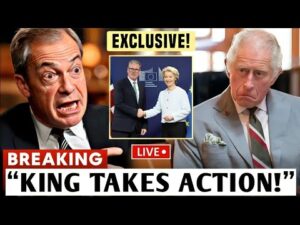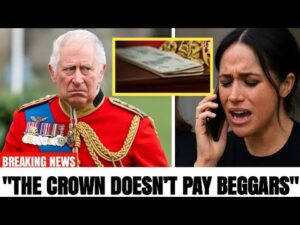Catherine CROWN as Real Queen In Private Ceremony And Camilla Reaction Says It All.

There’s something strange unfolding beneath the polished smiles and royal waves of the Duke and Duchess of Sussex. It’s not happening in London or Montecito, but in a place they thought would welcome them with open arms: Nigeria. Yes, Nigeria—Africa’s most populous nation—vibrant, youthful, complex; a country of boundless culture, pride, and a deep-rooted connection to identity. So why then has Nigeria just rejected Prince Harry and Meghan Markle’s second visa request? And more disturbingly, what aren’t they telling us?
Before we unravel this baffling turn of events and explore the layers behind it (from diplomatic murmurs to royal legacy baggage), make sure you subscribe to our channel. Join us as we uncover the stories buried under the headlines—the ones that make you question everything. Because this isn’t just about a visa; it’s about influence; it’s about secrets; and it might just be the biggest quiet scandal no one saw coming.
It started with a trip. There are unconfirmed reports that their original visa (granted during their first visit) was processed unusually quickly, through informal back channels. If true, that could have raised questions internally: Were normal immigration protocols bypassed? Who pulled the strings, and why? After their departure, local watchdogs reportedly began scrutinizing the trip more closely—financial transparency, meeting disclosures, press restrictions—all came under review. The conclusion: The visit had overstepped some boundaries, and that led to the quiet but firm decision that they would not be allowed back.
But here’s where things turn even darker. Because according to several insiders, the Nigerian rejection wasn’t just about bureaucracy; it was about preserving sovereignty, preventing what one official allegedly described as “cultural infiltration under the guise of Heritage Connection.” That phrase—”cultural infiltration”—is haunting. Is that how Meghan’s embrace of her Nigerian DNA was perceived behind closed doors—a calculated move rather than a heartfelt reunion? We may never know the full truth, but the reaction was telling. Social media began to shift. Nigerian influencers who once praised Meghan’s visit began to question its authenticity. Was it all performative? A PR move? Another staged moment in the ongoing Sussex media machine?
And yet, it’s not just Nigeria asking these questions. Across the continent, many have begun to reassess the implications of Western celebrities (particularly those with royal ties) using Africa as a backdrop for redemption narratives. Because let’s be honest, Africa has long been used this way—from missionary tales to celebrity charity trips, the West often turns to Africa when it needs to cleanse, to rebrand, to find meaning. But in 2025, Africans are no longer passive characters in someone else’s story; they’re writing their own, with pride and power. So when Meghan steps onto Nigerian soil, wearing Ankara and quoting DNA statistics, is she connecting or co-opting? When Harry speaks about trauma in a country still battling Boko Haram and economic instability, is he helping or simplifying? These are not easy questions, but they matter. And now, with their second visa denied, the Sussexes find themselves at a crossroads. Do they push harder, attempt diplomatic intervention through back channels? Or do they quietly step back and ask themselves what really went wrong?
And yet, the most disturbing part is this: What if the rejection wasn’t entirely about politics? What if something else happened during their first visit? Something not yet made public? Something that triggered a decision so swift, so silent, that not even their global PR team could spin it? We’ll explore that possibility in a moment. But first, what really happened during Meghan’s private meeting with Nigeria’s Minister of Information? Why were journalists barred from the press briefing that followed? And why did Nigerian intelligence reportedly open a short-term file on the Sussexes just days before they arrived? Something isn’t adding up.
What happened behind those closed doors remains one of the most closely guarded mysteries of their entire visit. Meghan’s private sit-down with Nigeria’s Minister of Information, Al-Haji Muhammad Idris, was scheduled for a modest 30 minutes, but according to a senior aide, the meeting lasted nearly two hours. Not a single image was released; no transcript; no joint statement. When reporters tried to ask questions afterward, they were redirected. And for those who pushed harder, official press credentials for the day were quietly revoked. That might have gone unnoticed had it not been for what came next.
A known Nigerian investigative journalist (who we’ll call Kemi for her safety) revealed (in a now-deleted tweet) that the Duchess had requested strategic media cooperation between Nigerian networks and her team at Archewell. Cooperation for what exactly? That was never clarified, but Kemi hinted that there was an offer—one involving favorable coverage, future documentaries, and possibly even production incentives. If true, it would suggest that Meghan’s trip wasn’t merely symbolic; it was a soft power move—an attempt to gain cultural and media foothold in one of the fastest-growing entertainment industries in the world, Nollywood.
And here’s where it gets chilling. Just days after that meeting, a classified memo was allegedly circulated within the Ministry of Foreign Affairs. The contents of that memo have never been publicly revealed, but leaks suggest it contained the words “unauthorized content negotiation,” “non-diplomatic intent,” and “monitor return attempts.” In simple terms, they were flagged. What began as a heritage visit may have been interpreted (rightly or wrongly) as a calculated incursion into the country’s internal affairs. And Nigeria (having long dealt with Western overreach) was not going to sit quietly this time.
But the story doesn’t stop there, because this wasn’t just about Meghan. During their visit, Prince Harry had a separate closed-door meeting with members of Nigeria’s military leadership under the banner of expanding the Invictus Games footprint. He spoke about trauma recovery, veteran rehabilitation, and integrating Nigerian athletes into global competitions. On paper, this sounds noble. But Nigeria’s military is currently engaged in one of the most complex counterinsurgency campaigns in the world—battling extremists in the northeast, addressing separatist tensions in the southeast, and walking a tightrope with foreign advisors. So when a foreign royal (even a retired one) begins asking questions about troop morale, PTSD, and rehabilitation programs, it naturally raises concerns—especially if those conversations are undocumented and unmonitored by official diplomatic channels. Was Harry’s meeting seen as crossing a line? Perhaps. According to a retired Nigerian Army colonel (who spoke under anonymity), “It looked like an outreach mission, but we couldn’t tell who he was representing—Britain, himself, America. And that uncertainty alone makes it dangerous.”
Let that sink in for a moment. Harry and Meghan may have unwittingly positioned themselves as international influencers without clear allegiance—no longer royals in a formal sense, yet still wielding the power, press, and presence of royalty. They travel with security details, receive state-level receptions, and speak with the gravity of emissaries. But in the eyes of foreign governments, that ambiguity is a risk. And then there’s the footage. Yes, there was footage captured by local press, briefly aired on a Nigerian morning show, and then mysteriously pulled from rotation. The clip showed Meghan exiting a private cultural center in Lagos, clutching a sealed envelope. She was flanked by two local advisors and a man who appeared to be from the US consulate. The envelope was handed to her by the chief of the Yoruba traditional council. He has not commented publicly on the interaction, but insiders say the contents were culturally sensitive materials not meant for international circulation. Did Meghan inadvertently transport something sacred? Or was it something else entirely—a symbolic gesture misunderstood by authorities? Either way, the footage vanished, and the traditional chief hasn’t spoken publicly since.
What followed in the next 48 hours was a whirlwind. The couple abruptly cut short their visit, skipped an announced community event in Abuja, and left the country with minimal fanfare. Officially, the story was spun as a scheduling change. But unofficially, it felt like a diplomatic extraction. And yet, all of this raises a more haunting question: Were Harry and Meghan warned to leave? There’s growing belief that the British High Commission in Nigeria (though no longer officially affiliated with the Sussexes) intervened quietly, ensuring their safe and unpublicized departure. There are even rumors of a last-minute flight adjustment and a nighttime motorcade through Abuja’s back streets. If that’s true, then this wasn’t just a canceled visa; it was a warning shot—a way of saying, “Don’t come back. Not like this. Not again.”
But what does this mean for the Sussexes’ global ambitions? Meghan and Harry have repeatedly styled themselves as humanitarian leaders, post-royal reformers of sorts. They want to champion causes—from gender equality to mental health, climate justice to cultural dialogue. But they’ve walked a fine line, using their royal fame to gain access while distancing themselves from the monarchy’s responsibilities. In the West, that paradox is tolerated, even applauded. But in places like Nigeria (with deep wounds from colonial pasts, delicate political balances, and highly scrutinized borders), the rules are different. If they return, it would likely require an entirely new approach—one rooted in transparency, humility, and perhaps even apology.
But perhaps the most poignant piece of this saga lies not in politics but in perception. Because when the news of their visa rejection finally began leaking through diplomatic grapevines, it wasn’t just the Nigerian elite who reacted; everyday citizens began speaking out, too. Some expressed disappointment; others, betrayal. A Lagos University student posted a now-viral video questioning Meghan’s motives: “Did she come here to learn or to brand us?” A market vendor near Abuja said, “She wore our fabric but did not eat with us. She smiled in our dance but did not sit to understand our pain.” These words may seem small, anecdotal. But they matter. They show that influence without intimacy, fame without familiarity, can often backfire. Harry and Meghan (for all their charm and charisma) may have miscalculated the complexity of connection. And now their second visa request is more than just a denied application; it’s a statement—a line drawn quietly but decisively in the sand.
Still, one final layer remains, and it could change everything. Because buried in a diplomatic bulletin (dated only two weeks after their departure) was a cryptic reference to an external advisory from an allied intelligence body recommending Nigeria temporarily withhold future access to individuals “known for controversial geopolitical commentary.” The advisory was not named, but those familiar with inter-agency communication point to one likely source: MI6. Yes, British intelligence. Could it be that Britain itself (the very monarchy Harry abandoned) had a role in urging Nigeria to slam the door? If true, it would mean that Harry and Meghan’s actions abroad are being tracked not just by tabloids or fans, but by intelligence agencies concerned with soft power, destabilization, and global optics. It suggests the Sussexes are now more than public figures; they are a geopolitical variable.
If Harry and Meghan have indeed crossed a line (intentionally or not), then the question becomes: Where do they go from here? Their brand is rooted in reinvention—of monarchy, of narrative, of themselves. But reinvention comes with a price, and every stage requires credibility. Nigeria was supposed to be a crowning moment—Meghan’s emotional return to a land that she says connects her to her roots, to resilience, to identity. But what began as a hopeful reconnection has become something darker, more complicated. Now, global audiences are watching closely—not just their next move, but how they respond to rejection. Will they retreat into silence, nursing another wound in their long list of public betrayals? Or will they double down, reframing the narrative once again, positioning themselves as misunderstood ambassadors who dared to speak truth to power?
And let’s not forget: The world they operate in has changed dramatically. In an age where perception is reality, Meghan and Harry’s ability to control the story is no longer guaranteed. There are whistleblowers, journalists, leaked memos, viral videos, and entire populations unwilling to let Western celebrities waltz into their nations without real engagement or accountability. For Nigeria (a country of over 200 million people, rich in heritage, power, and untold stories), this is not about Meghan Markle’s ancestry; this is about sovereignty, about dignity, about refusing to be a backdrop in someone else’s redemption arc.
And for Buckingham Palace, the silence has been deafening—no official comment, no endorsement, no clarification. Which raises yet another troubling question: Was this the moment the monarchy quietly severed its final invisible thread to the Sussexes? After all, for all the talk of exile, there have always been rumors of backdoor communications, olive branches, possible reconciliation. But if intelligence agencies and diplomatic offices are now alerting each other to the couple’s international influence, then reconciliation may be off the table for good. And in that silence, a new reality has taken shape. Behind Palace walls, senior courtiers are said to be closely monitoring the couple’s overseas activity—not out of nostalgia or family loyalty, but out of concern for reputational fallout. Every speech Harry gives about mental health, every panel Meghan joins about feminism or race, now gets filtered through the lens of diplomacy, not just media. Because here’s the brutal truth: When royals speak (even ex-royals), nations listen. And when that speech becomes blurred with ideology, activism, or agenda, consequences follow.
But perhaps the most tragic irony of all is this: Harry and Meghan may have truly believed they were doing something good. By visiting Nigeria, they might have hoped to inspire, to raise visibility for wounded veterans, empower young women, bridge cultures. And in another timeline, maybe they would have. But the path to goodwill cannot be paved with assumptions. Not every country is waiting to be rescued; not every audience welcomes symbolism over substance; and not every culture will forgive an outsider who arrives with cameras before conversation. This wasn’t just a diplomatic misstep; it was a mirror reflecting back everything the Sussexes have tried to escape and everything they’ve unconsciously carried with them. Because for all their talk of liberation, they’re still entangled in the machinery of fame. And fame (as Nigeria just proved) has limits.
So what happens now? There are whispers that Meghan’s team has reached out to other African nations (Ghana, Kenya, Rwanda), exploring opportunities for future visits, but none have confirmed plans; all remain cautious. And behind the scenes, public relations firms are working overtime to course-correct, to soften the narrative, to reshape what has become a storm of rejection into a lesson learned. Will it work? Maybe. After all, public memory is short, and the Sussexes have always been masters of reinvention. But a stain like this (one involving culture, diplomacy, and trust) does not wash away easily. In the coming months, we may see carefully curated interviews, a new documentary, a philanthropic initiative announced in Nigeria’s name—maybe even a teary-eyed sit-down with Oprah 2.0. But beneath the polished surface, something has shifted. A door has closed—not with anger, not with scandal, but with the quiet, resolute power of a nation that refused to play along.
The story concludes here as requested, leaving the future actions of Harry and Meghan, and the long-term consequences of their Nigerian visa rejection, open-ended.







